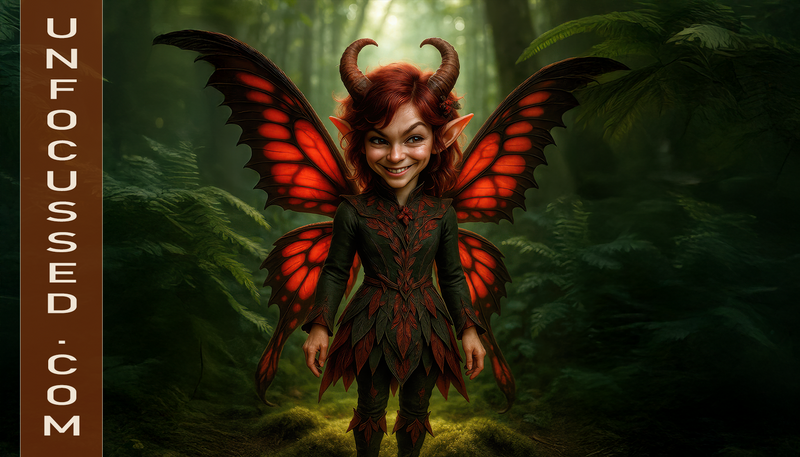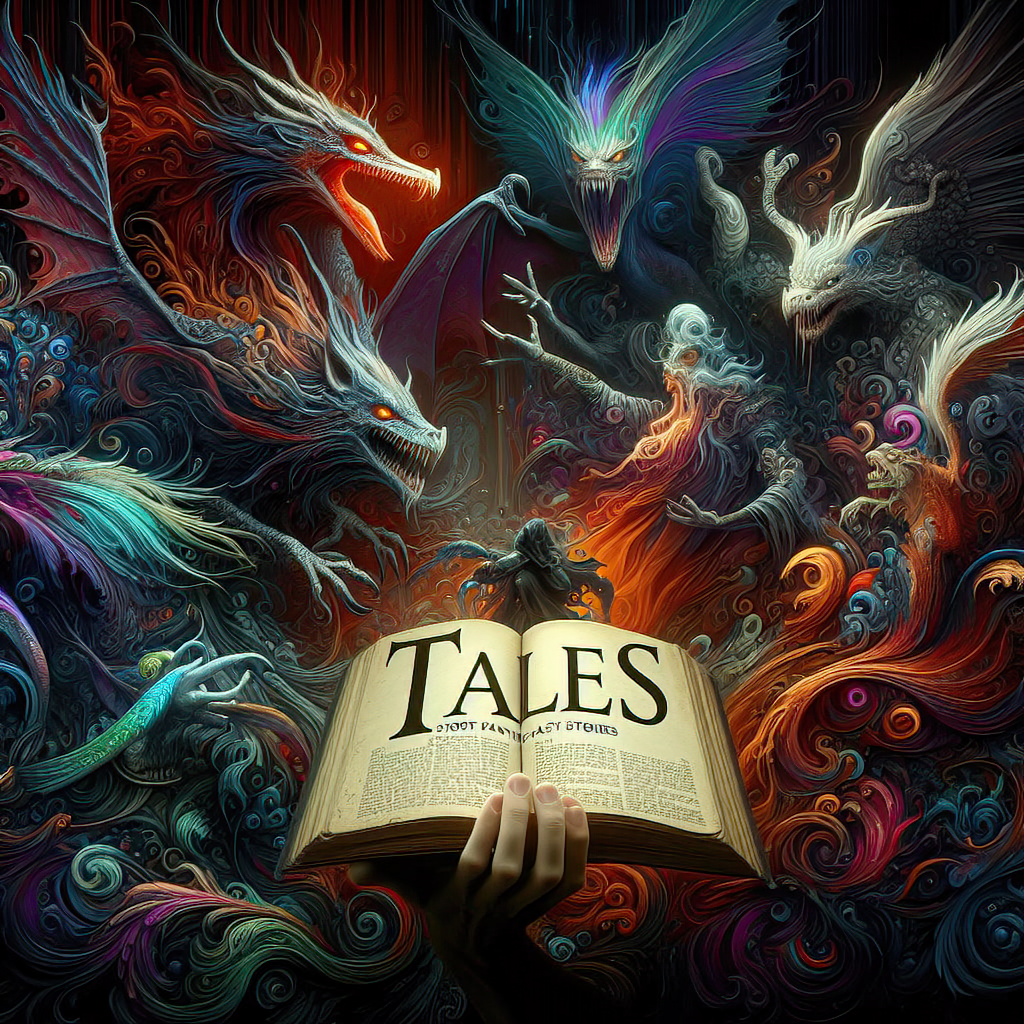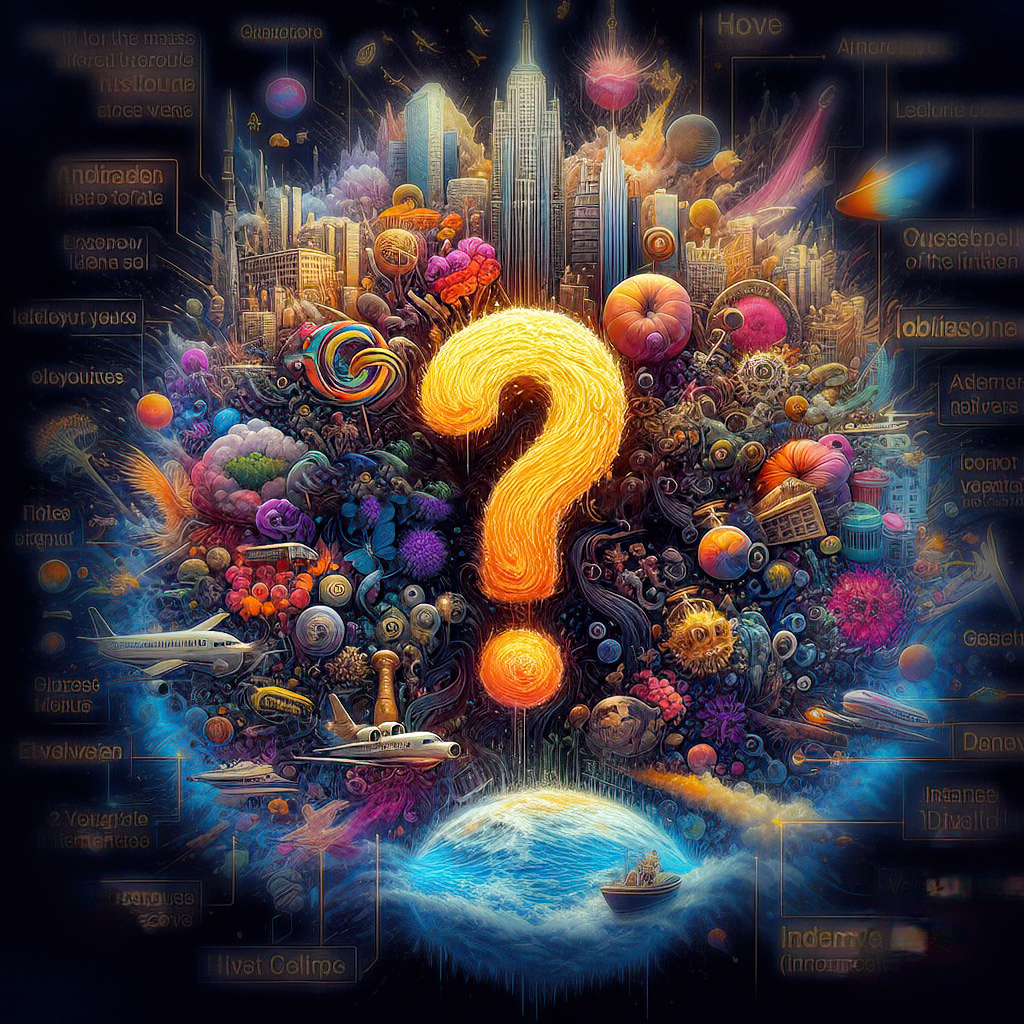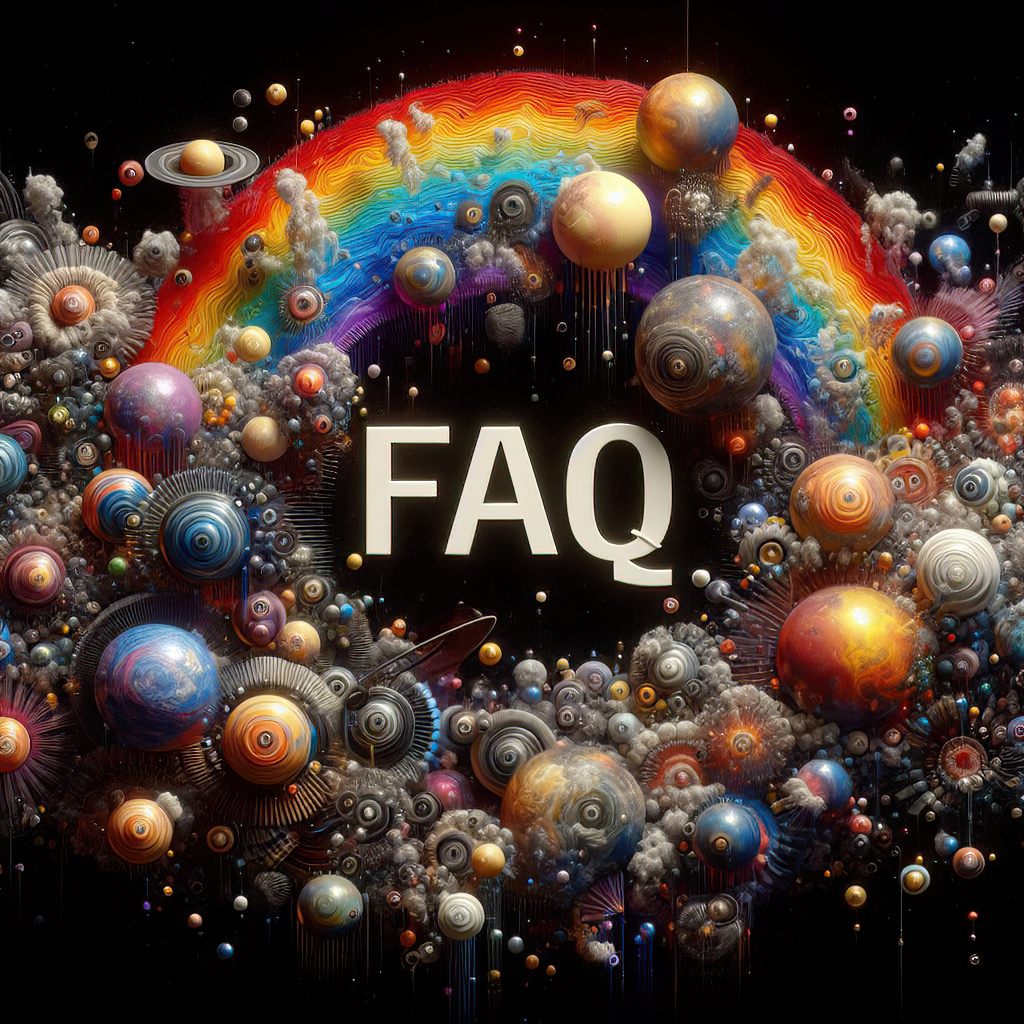
by Bill Tiepelman
Cradle of Copper Veins
There are stories the trees tell long after the last leaf has fallen. Stories whispered not in words, but in sighs of wind and flickers of gold that dance between branches. And if you know how to listen — really listen — you’ll hear the tale of a fairy named Cress, who came into this world nestled in a leaf so grand it rivaled the sails of a galleon, glowing with the luster of hammered copper. Cress wasn’t born like other fairies. No flick of a wand, no moonbeam ceremony. One morning, just as autumn was stretching its fingers into the roots of the woods, a sleepy breeze tumbled through the Great Hollow, and there she was — curled up in the crook of a leaf like a blessing too delicate for noise. Her hair was spun sunlight, her wings etched from morning frost, and her face was the kind that could convince even the crankiest mushroom to smile. The elder fairies didn’t quite know what to make of her. "Too quiet," muttered Bramble Fernthistle, adjusting his acorn monocle. "No sparkle. No twinkle. Probably defective." But Cress just smiled in her sleep, utterly unmoved by fairy bureaucracy. Her leaf cradle had fallen from the ancient maple, a tree known to whisper to stars. And so, some believed she wasn’t born at all — but sent. By whom? Theories abounded. The stars? The wind? A goddess with a sense of humor and a flair for the dramatic? Only one thing was certain: Cress had a vibe. A powerful, soul-hugging, peace-tinted kind of vibe. The kind that made squirrels pause mid-acorn. That made spiders crochet doilies instead of webs. That made the morning dew linger just a little longer to kiss her forehead. And then, the dream started spreading. At first, only forest creatures felt it — a lightness in their paws, a softness in their heartbeats. Then, the trees began to hum lullabies without wind. Next came the clouds, lowering just enough to catch a glimpse of her as they passed. Even the grumpy badger near the western brook was spotted knitting something that might’ve been a scarf. He’d deny it to his dying breath, of course. But the yarn was pink and had glitter in it. “She’s... changing us,” said Maplewish, the oldest of the grove. “With sleep. And silence. And possibly drool.” But it was more than that. It was presence. This tiny, dreaming fairy, in her copper-leaf cradle, radiated such gentle purpose that even time slowed down to admire her. She didn’t ask. She didn’t preach. She simply *was.* And in her being, the forest remembered who it was supposed to be. And then, one morning, she woke up. Cress’s first breath was soft — like the exhale of a songbird in a dream. Her eyes fluttered open beneath the dappled amber light of morning, and the entire forest held its breath. Even the breeze paused, unsure if it was appropriate to move now that she was looking. Her gaze didn’t scan the canopy or jump to the curious throngs of forest watchers perched atop mushrooms, owls, and the backs of patient deer. Instead, she stared with hypnotized wonder at the edge of her copper-veined leaf, her tiny fingers tracing its ridges like they were the edges of a secret map. “She’s... awake,” gasped Thistlemop, a woodsprite with anxiety issues and a flair for the dramatic. He immediately fainted into a puff of glitter, which was honestly not that uncommon for him. “Bless the bark, what do we do now?” someone whispered. “Do we clap? Bow? Offer her the ceremonial acorn?” But Cress didn’t ask for pomp or parades. She sat up slowly, yawned a yawn so wide it made a nearby chipmunk pass out from cuteness, and blinked at the world as if seeing it for the first time and deciding it might be worth forgiving. She had the kind of aura that turned bee stings into butterflies. No one knew why. Maybe it was her silence — the way she listened before speaking. Or maybe it was how she giggled at dandelion seeds like they were stand-up comedians. Either way, by noon that day, the Council of Elders had declared a full fairy holiday. They called it “Cressmas.” It had very little structure, involved a lot of spontaneous naps, and a cake made of dew and wild honey. And from that moment on, the Forest changed. Animals that had held grudges for decades forgave each other. A squirrel and a raven opened a bookstore. Moss began growing in intricate, artful spirals instead of the usual blob formations. Even the mushrooms glowed brighter, murmuring little psalms in their sleep. And the fairies? The fairies, once obsessed with sparkle quotas and wing inspections, stopped fussing long enough to notice the way the stars blinked a little slower over Cress’s leaf. She didn’t speak for several moons. She didn’t have to. Her expressions spoke entire novels. Her laughter unknotted years of forest tension. And when she finally did speak, it was to the old willow who asked her what she dreamed about. “Warmth,” she said. “And something that hasn’t happened yet.” That night, an aurora bloomed in colors the sky had forgotten it owned. From then on, Cress became the pulse of the woods. Not a ruler — heavens no. She didn’t even like chairs. But a presence. A rhythm. When she was near, you remembered what joy tasted like. You remembered to breathe slower. You forgave the ants for being obnoxious, and you let the raindrops roll down your nose without wiping them off in irritation. And the thing was, she *grew.* Not in size (fairy babies are notoriously stubborn about that), but in essence. Her eyes became galaxies of green and gold. Her wings shimmered with patterns that matched the phases of the moon. Her laughter caused flowers to bloom off-season. She once smiled at a frog so warmly that it developed complex emotions and started writing poetry. But as Cress’s magic deepened, so did her knowing. She began to wander. Always with kindness. Always with her leaf, which had curled into the shape of a gentle sled. She visited every root, every rock, every burrow and blossom. Creatures she’d never seen leaned forward when she passed. Foxes bowed. Owls wept. Even the grumpy badger made her a mug with her name on it. It said “Little One, Big Deal.” He denied it was sentimental, of course. Said it was a tax write-off. Eventually, Cress arrived at the edge of the forest, where the tall grass met the world beyond. She tilted her head. The wind tousled her hair in question. She didn’t speak. She simply stepped beyond the wild bramble, dragging her copper cradle behind her — into the Great Beyond where the forest’s hum couldn’t quite reach. “Where’s she going?” asked a curious beetle. “Everywhere,” said Maplewish, wiping a tear of sap from his cheek. “She’s what happens when the forest remembers its heart. But hearts don’t stay still, do they?” They didn’t. And neither did she. From the cities with sirens to deserts that hummed at dusk, Cress wandered. People never remembered her clearly — only that they had wept without knowing why, or danced without knowing how. Coffee tasted sweeter. Tempers felt slower. Strangers gave each other snacks. Dogs stopped barking at mailmen. And all across the land, wherever she had passed, autumn leaves curled slightly into cradles, waiting for someone else — someone gentle, and wild, and quietly powerful — to remember who they were. The years passed, as they tend to do — sneaky little things, fluttering past like moths in the dusk. Cress walked through them all barefoot and curious, never in a hurry, never quite belonging to time. Wherever she wandered, something happened — not big, explosive somethings. No fireworks. No thunder. Just... small shifts. Quiet revolutions. In the sleepy town of Mirebell, a cobbler began leaving one extra shoe outside his shop every morning. He said it was for "the tired." He didn't specify who. He didn’t need to. In the mountains of Nareth, where the winds carved stone like gossiping grandmothers, wild goats stopped headbutting each other for dominance and started organizing cliffside yoga. In the farmlands of Brindlehusk, a young boy whose heart had grown too heavy from loss woke up one morning to find an amber-colored leaf cradling a single pearlescent tear on his pillow. It was dry. And so, for the first time in months, were his cheeks. And in all these places, there were whispers of a girl — a child, or a woman, or a spirit, no one could quite agree — whose presence made you want to call your grandmother and tell her you loved her, even if she was already dead. Especially if she was already dead. “She’s made of lullabies,” someone once said. “No,” said another. “She’s made of the silence between lullabies.” One autumn, in a city made of steel and cracked pavement, Cress found herself standing beside a woman in a power suit who looked like she'd forgotten how to cry. They waited for the same bus. The woman had earbuds in and an expression like a snapped pencil. But Cress — wearing a crown of dandelions and a sweater knitted from something very much like moonlight — just stood beside her, gently humming a note that made a nearby pigeon forget how to scowl. When the woman looked over, Cress met her eyes with that look. That look that says: I see you, and you don’t owe the world another performance. And something broke, gently. The woman sat down on the curb and sobbed into her coffee. It tasted better after. And still, Cress moved on. Always on. Her copper-veined leaf, now worn and glossy like an heirloom spoon, trailed behind her like a promise — rustling with stories not yet told. She never sought fame, though her legend grew. She never stayed long, though some swore they still saw her in the corners of their favorite memories. Eventually — and inevitably — she returned to the forest. Not because she had to. Not because the wind whispered her name or the mushrooms staged a union strike in protest of her absence (although they had considered it). She returned because love always circles back, like rivers, like stories, like the moon to its favorite phase. By now, the forest had changed. Grown taller, more knotted in places, but also softer. The grumpy badger had opened a therapy burrow. The bookstore run by the squirrel and raven had a poetry section curated by frogs. And the trees — oh, the trees — they leaned in, their branches trembling with reverence as Cress stepped once more into the amber light beneath their boughs. She looked older. Not old. Just... fuller. More galaxy than girl now. Her wings shimmered with memories. Her eyes held galaxies she hadn’t been born with. She no longer slept in the cradle of copper veins. But she carried it still, curled gently over her shoulder like a shawl woven from goodbye and gratitude. “You came back,” gasped Maplewish, now stooped and silvered with lichen. “I was always here,” she said, and kissed his bark. And then, one morning — golden, as if the sun had remembered how to fall in love — Cress walked into the center of the grove and lay down upon her leaf. Not to sleep, this time. But to root. The leaf curled up around her like it had been waiting centuries for this moment. The wind cradled her name and let it echo one last time. The animals watched, not with sorrow, but reverence. Something bigger than grief bloomed in their bellies — a feeling like finishing a perfect book and hugging it to your chest. And where she lay, a tree grew. It wasn’t like any other tree. Its trunk shimmered like burnished bronze, its leaves whisper-thin and luminous, curling like parchment in the wind. Flowers bloomed on its branches year-round — forget-me-nots, wild violets, even the occasional curious mushroom. Its roots hummed lullabies. And at its base, nestled in moss, was the copper-veined leaf, forever cradling a memory, forever becoming. They say if you sit beneath it long enough, you’ll remember a part of yourself you forgot how to love. You’ll find yourself weeping without knowing why. You’ll leave lighter than you came. And just sometimes, when the light hits right and your heart is quiet enough — you’ll see her. Not as a ghost. Not as a fairy. Not even as a girl. But as a feeling. As hope. As the whisper between songs. And when you rise to go, you’ll carry her with you — like warmth. Like wonder. Like home. If the magic of Cress still lingers in your chest — if her warmth, her quiet wonder, and her copper-veined cradle whispered something to your soul — you’re not alone. And you don’t have to leave her behind. Her spirit now lives on in a collection of inspired creations, ready to bring a little forest magic into your own sacred space. Adorn your walls with the story’s essence through a canvas print or a dreamy, flowing tapestry that lets the golden hues of autumn cradle your room. Curl up with her comfort woven into a throw pillow or wrap yourself in wonder beneath a duvet cover that feels like a forest lullaby. For a touch of magic on the move, carry the story with you in a lovely tote bag, perfect for dreamers and wanderers alike. However you choose to keep her near, may her presence remind you to slow down, breathe deep, and believe in the quiet strength of softness.








